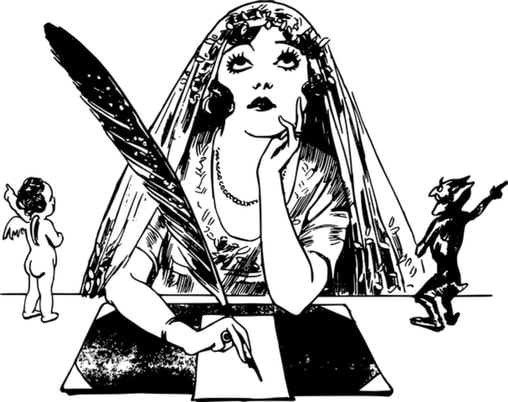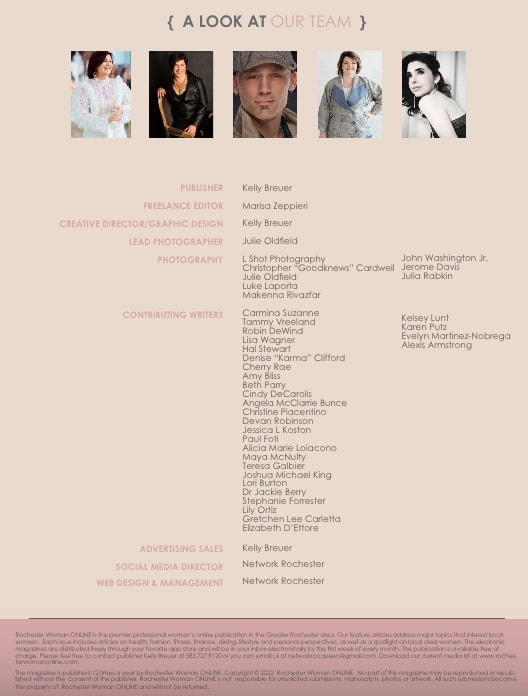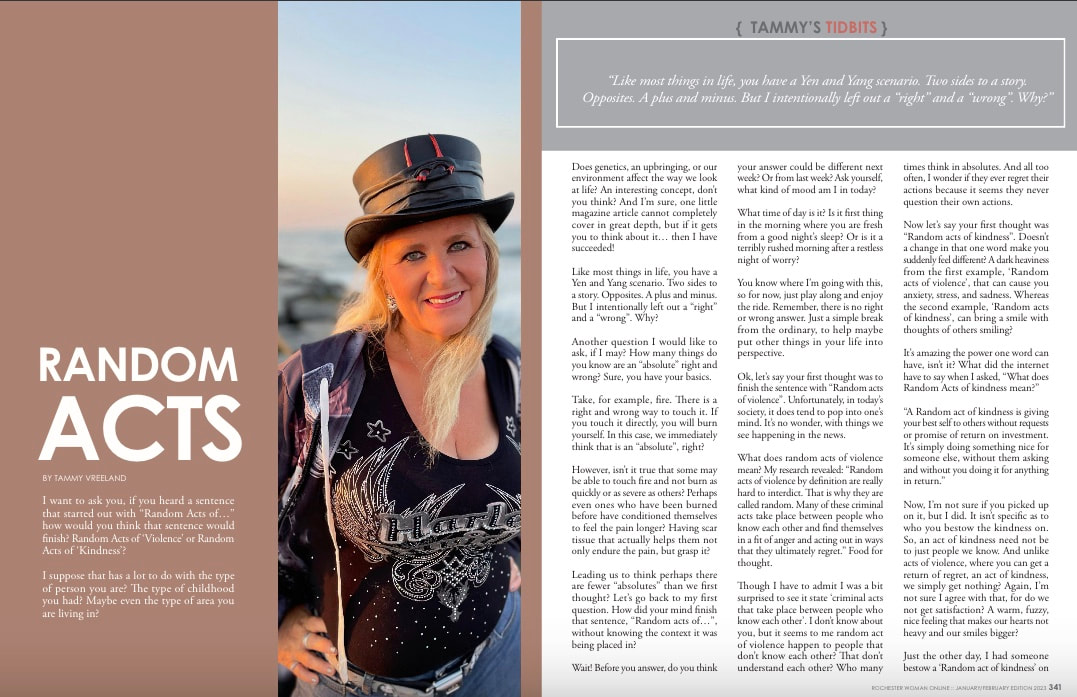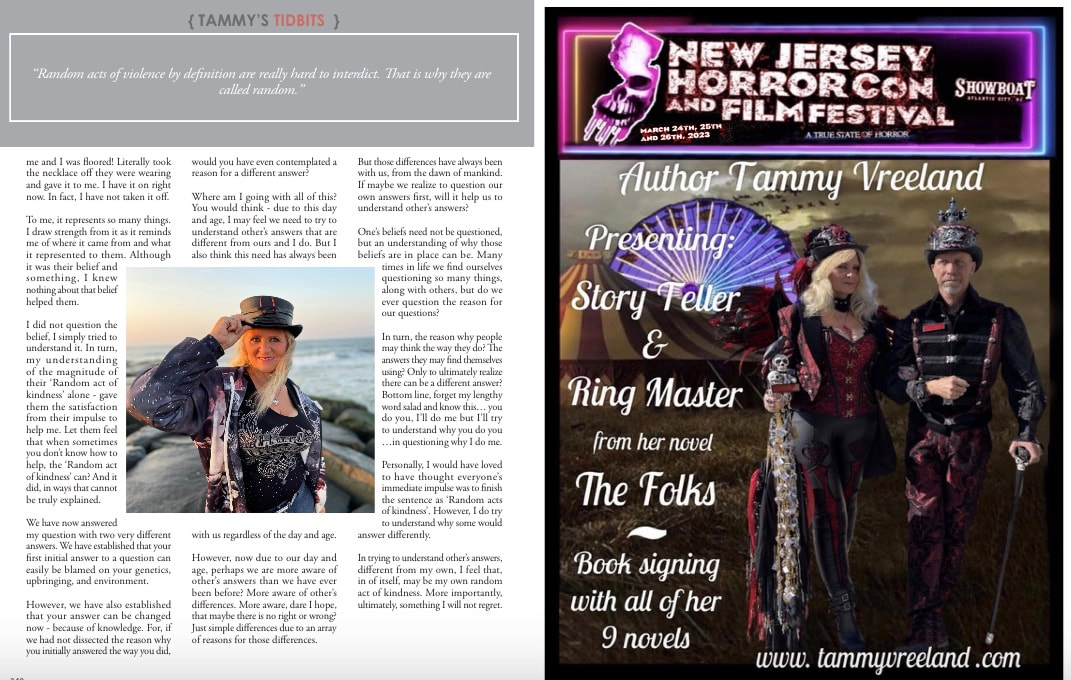Tammy's Tidbits
Random Acts
Random Acts
I want to ask you, if you heard a sentence that started out with “Random Acts of…” how would you think that sentence would finish?
I suppose that has a lot to do with the type of person you are? The type of childhood you had? Maybe even the type of area you are living in?
Does genetics, an upbringing, or our environment affect the way we look at life? An interesting concept, don’t you think? And I’m sure, one little magazine article cannot completely cover in great depth, but if it gets you to think about it… then I have succeeded!
Like most things in life, you have a Yen and Yang scenario. Two sides to a story. Opposites. A plus and minus. But I intentionally left out a “right” and a “wrong”. Why?
Another question I would like to ask, if I may? How many things do you know are an “absolute” right and wrong? Sure, you have your basics.
Take, for example, fire. There is a right and wrong way to touch it. If you touch it directly, you will burn yourself. In this case, we immediately think that is an “absolute”, right?
However, isn’t it true that some may be able to touch fire and not burn as quickly or as severe as others? Perhaps even ones who have been burned before have conditioned themselves to feel the pain longer? Having scar tissue that actually helps them not only endure the pain, but grasp it?
Leading us to think perhaps there are fewer “absolutes” than we first thought? Let’s go back to my first question, how do you finish this sentence: “Random acts of…”
Wait! Before you answer, do you think your answer could be different next week? Or from last week? Ask yourself, what kind of mood am I in today?
What time of day is it? Is it first thing in the morning where you are fresh from a good night’s sleep? Or is it a terribly rushed morning after a restless night of worry?
You know where I’m going with this, so for now, just play along and enjoy the ride. Remember, there is no right or wrong answer. Just a simple break from the ordinary, to help maybe put other things in your life into perspective.
Ok, let’s say you finished the sentence with “Random acts of violence.” Unfortunately, in today’s society, it does tend to pop into one’s mind. Its no wonder, with things we see happening in the news.
I don’t normally do this but I am going to quote word for word what the internet said when I asked, “What does random acts of violence mean?”
It said: “Random acts of violence by definition are really hard to interdict. That is why they are called random. Many of these criminal acts take place between people who know each other and find themselves in a fit of anger and acting out in ways that they ultimately regret.”
Food for thought. Though I have to admit I was a bit surprised to see it state ‘criminal acts that take place between people who know each other’. I don’t know about you, but it seems to me random act of violence happens to people that don’t know each other. That don’t understand each other. Who many times think in absolutes. And all to often, I wonder if they ever regret their actions?
Now let’s say you answered the question with “Random acts of kindness.” Doesn’t a change in that one word make you suddenly feel different? A dark heaviness from the first example, acts of violence, can cause you anxiety, stress, and sadness. Whereas the second example, acts of kindness, can bring a smile with thoughts of other’s smiling?
It’s amazing the power one word can have, isn’t it? What did the internet have to say when I asked, “What does Random Acts of kindness mean?”
“A Random act of kindness is giving your best self to others without requests or promise of return on investment. It's simply doing something nice for someone else, without them asking and without you doing it for anything in return.”
Now, I’m not sure if you picked up on it but I did. It isn’t specific as to who you bestow the kindness on. So, an act of kindness need not be to just people we know. And unlike acts of violence, you get a return of regret, whereas an act of kindness we simply get nothing? Again, I’m not sure I agree with that for do we not get satisfaction, a warm, fuzzy nice feeling that makes our hearts not heavy and our smiles bigger?
Just the other day, I had someone bestow a random act of kindness on me and I was floored! Literally took the necklace off they were wearing and gave it to me. I have it on right now. In fact, I have not taken it off.
To me it represents so many things. I draw strength from it as it reminds me where it came from and what it represented to them. Although it was their belief and something, I knew nothing about it helped them.
I did not question the belief, I simply tried to understand it. In turn, my understanding the magnitude of the act of kindness alone, gave them the satisfaction from their impulse to help me. Let them feel, when sometimes you don’t know how to help, the act of kindness can. And it did, in ways that cannot be truly explained.
We have now answered my question with two very different answers. We have established that your answer to the question can easily be blamed on your genetics, upbringing, and environment.
However, we also established that your answer can be changed now because of knowledge. For, if we had not dissected the reason why you initially answered the way you did, would you have even contemplated a reason for a different answer?
Where am I going with all of this? You would think due to this day and age, I may feel we need to contemplate other’s answers. I do. But I also think this need has always been with us.
Perhaps now only because we are more aware of other’s answers. More aware of other’s differences. More aware, dare I hope, that maybe there is no right or wrong?
But those differences have always been with us, from the dawn of mankind. If maybe we realize to question our own answers first, will it help us to understand other’s answers?
One’s beliefs need not be questioned, but an understanding of why those beliefs are in place can be. Many times in life we find ourselves questioning so many things, along with others, but do we ever question the reason for our questions?
In turn, the reason why people may think the way they do? The answers they may find themselves using? Only to ultimately realize there can be a different answer?
Personally, I would love for everyone to have finished the sentence as ‘Random acts of kindness’. However, I do try to understand why some would answer differently.
In trying to understand other’s answers, different from my own, I feel may be my own random act of kindness. More importantly, ultimately, something I will not regret.
I suppose that has a lot to do with the type of person you are? The type of childhood you had? Maybe even the type of area you are living in?
Does genetics, an upbringing, or our environment affect the way we look at life? An interesting concept, don’t you think? And I’m sure, one little magazine article cannot completely cover in great depth, but if it gets you to think about it… then I have succeeded!
Like most things in life, you have a Yen and Yang scenario. Two sides to a story. Opposites. A plus and minus. But I intentionally left out a “right” and a “wrong”. Why?
Another question I would like to ask, if I may? How many things do you know are an “absolute” right and wrong? Sure, you have your basics.
Take, for example, fire. There is a right and wrong way to touch it. If you touch it directly, you will burn yourself. In this case, we immediately think that is an “absolute”, right?
However, isn’t it true that some may be able to touch fire and not burn as quickly or as severe as others? Perhaps even ones who have been burned before have conditioned themselves to feel the pain longer? Having scar tissue that actually helps them not only endure the pain, but grasp it?
Leading us to think perhaps there are fewer “absolutes” than we first thought? Let’s go back to my first question, how do you finish this sentence: “Random acts of…”
Wait! Before you answer, do you think your answer could be different next week? Or from last week? Ask yourself, what kind of mood am I in today?
What time of day is it? Is it first thing in the morning where you are fresh from a good night’s sleep? Or is it a terribly rushed morning after a restless night of worry?
You know where I’m going with this, so for now, just play along and enjoy the ride. Remember, there is no right or wrong answer. Just a simple break from the ordinary, to help maybe put other things in your life into perspective.
Ok, let’s say you finished the sentence with “Random acts of violence.” Unfortunately, in today’s society, it does tend to pop into one’s mind. Its no wonder, with things we see happening in the news.
I don’t normally do this but I am going to quote word for word what the internet said when I asked, “What does random acts of violence mean?”
It said: “Random acts of violence by definition are really hard to interdict. That is why they are called random. Many of these criminal acts take place between people who know each other and find themselves in a fit of anger and acting out in ways that they ultimately regret.”
Food for thought. Though I have to admit I was a bit surprised to see it state ‘criminal acts that take place between people who know each other’. I don’t know about you, but it seems to me random act of violence happens to people that don’t know each other. That don’t understand each other. Who many times think in absolutes. And all to often, I wonder if they ever regret their actions?
Now let’s say you answered the question with “Random acts of kindness.” Doesn’t a change in that one word make you suddenly feel different? A dark heaviness from the first example, acts of violence, can cause you anxiety, stress, and sadness. Whereas the second example, acts of kindness, can bring a smile with thoughts of other’s smiling?
It’s amazing the power one word can have, isn’t it? What did the internet have to say when I asked, “What does Random Acts of kindness mean?”
“A Random act of kindness is giving your best self to others without requests or promise of return on investment. It's simply doing something nice for someone else, without them asking and without you doing it for anything in return.”
Now, I’m not sure if you picked up on it but I did. It isn’t specific as to who you bestow the kindness on. So, an act of kindness need not be to just people we know. And unlike acts of violence, you get a return of regret, whereas an act of kindness we simply get nothing? Again, I’m not sure I agree with that for do we not get satisfaction, a warm, fuzzy nice feeling that makes our hearts not heavy and our smiles bigger?
Just the other day, I had someone bestow a random act of kindness on me and I was floored! Literally took the necklace off they were wearing and gave it to me. I have it on right now. In fact, I have not taken it off.
To me it represents so many things. I draw strength from it as it reminds me where it came from and what it represented to them. Although it was their belief and something, I knew nothing about it helped them.
I did not question the belief, I simply tried to understand it. In turn, my understanding the magnitude of the act of kindness alone, gave them the satisfaction from their impulse to help me. Let them feel, when sometimes you don’t know how to help, the act of kindness can. And it did, in ways that cannot be truly explained.
We have now answered my question with two very different answers. We have established that your answer to the question can easily be blamed on your genetics, upbringing, and environment.
However, we also established that your answer can be changed now because of knowledge. For, if we had not dissected the reason why you initially answered the way you did, would you have even contemplated a reason for a different answer?
Where am I going with all of this? You would think due to this day and age, I may feel we need to contemplate other’s answers. I do. But I also think this need has always been with us.
Perhaps now only because we are more aware of other’s answers. More aware of other’s differences. More aware, dare I hope, that maybe there is no right or wrong?
But those differences have always been with us, from the dawn of mankind. If maybe we realize to question our own answers first, will it help us to understand other’s answers?
One’s beliefs need not be questioned, but an understanding of why those beliefs are in place can be. Many times in life we find ourselves questioning so many things, along with others, but do we ever question the reason for our questions?
In turn, the reason why people may think the way they do? The answers they may find themselves using? Only to ultimately realize there can be a different answer?
Personally, I would love for everyone to have finished the sentence as ‘Random acts of kindness’. However, I do try to understand why some would answer differently.
In trying to understand other’s answers, different from my own, I feel may be my own random act of kindness. More importantly, ultimately, something I will not regret.







